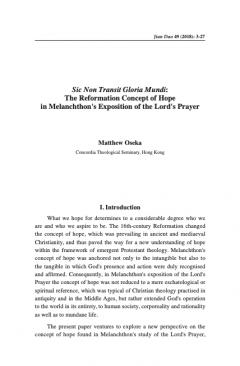Sic Non Transit Gloria Mundi: The Reformation Concept of Hope in Melanchthon's Exposition of the Lord's Prayer/Matthew Oseka
Matthew Oseka
ABSTRACT
The present paper examines the Reformation concept of hope in Melanchthon’s exposition of the Lord’s Prayer. The 16th-century Reformation changed the concept of hope, which was prevailing in ancient and mediaeval Christianity, and thus paved the way for a new understanding of hope within the framework of emergent Protestant theology. Melanchthon’s concept of hope was anchored not only to the intangible but also to the tangible in which God’s presence and action were duly recognised and affirmed. Consequently, in Melanchthon’s exposition of the Lord’s Prayer the concept of hope was not reduced to a mere eschatological or spiritual reference, which was typical of Christian theology practised in antiquity and in the Middle Ages, but rather extended God’s operation to the world in its entirety, to human society, corporeality and rationality as well as to mundane life.
撮要
本文研究墨蘭頓(Melanchthon)在宗教改革時期,在主禱文裏闡述有關盼 望的概念。十六世紀的宗教改革改變了基督教自早期及中世紀有關盼望的概念,因此也在當時冒起的新教神學框架裏,為盼望開闢了一條新的道路。墨蘭頓認為盼望是無形的,但同時也是有形的—能見於神的同在和行動中。因此,在墨蘭頓對主禱文的闡釋中,盼望並沒有被約化為只是一種終末或靈性的參考(典型的早期和中世紀基督教神學),而是更全面地延展了上帝對世界的管理,延展至人類社會、物質存在、理性,以及地上的生活。
原載於《建道學刊》49期(2018年1月),頁 3-28。







